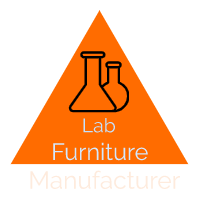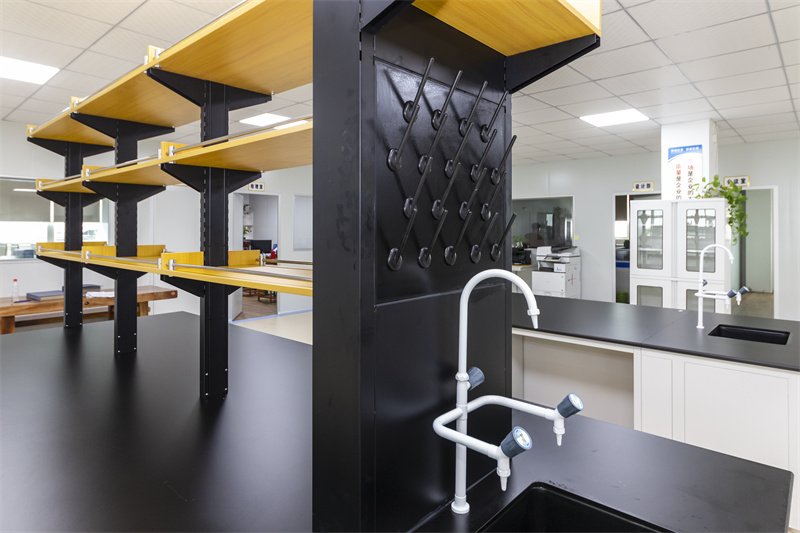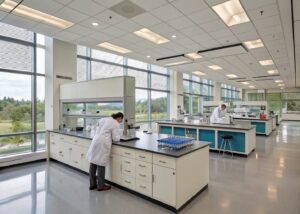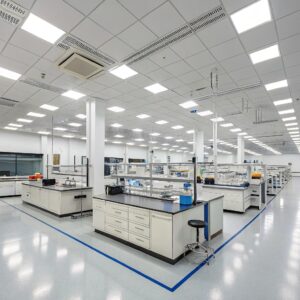When it comes to laboratory workbench surfaces, phenolic resin and epoxy resin tops are two of the most commonly used materials. Both have unique properties that make them suitable for various laboratory environments, but they also have distinct differences. This comprehensive comparison covers the production materials, chemical resistance, heat tolerance, moisture resistance, durability, aesthetic appeal, versatility, impact sensitivity, maintenance, cost, applications, and concludes which material might be best for your needs.
Table of Contents
The Production Material
Phenolic Resin:
Core materials: Phenol and formaldehyde.
Reinforcing agents: Cellulose, synthetic fibers.
Fillers and additives: Wood flour, mica, clay, plasticizers.
Epoxy Resin:
Core materials: Epichlorohydrin and bisphenolA.
Hardening agents: Amines, anhydrides.
Fillers and additives: Silica, calcium carbonate, alumina, pigments.
The Chemical Resistance
Phenolic Resin Chemical Resistance:
Phenolic resin tops offer excellent resistance to a wide range of chemicals, including most acids, alkalis, and solvents, particularly effective against organic solvents and nonoxidizing acids.
Epoxy Resin Chemical Resistance:
Epoxy resin tops provide superior resistance to harsh chemicals, including strong acids (such as hydrochloric and sulfuric acid), bases, and solvents, making them ideal for environments with frequent exposure to aggressive chemicals.
The Heat Tolerance
Phenolic Resin Heat Tolerance:
Phenolic resin tops can withstand temperatures up to approximately 135°C (275°F), suitable for most laboratory applications but not for extreme heat scenarios.
Epoxy Resin Heat Tolerance:
Epoxy resin tops can endure higher temperatures, often up to 200°C (392°F) or more, depending on the specific formulation, making them suitable for laboratories where high temperature processes are common.
Moisture Resistance
Phenolic Resin Moisture Resistance:
Nonporous and moisture resistant, phenolic resin tops are ideal for humid environments, preventing swelling, warping, or degradation over time.
Epoxy Resin Moisture Resistance:
Epoxy resin tops are also nonporous and highly resistant to moisture, making them suitable for wet laboratory environments and ensuring long term durability.
Durability
Phenolic Resin Durability:
Highly durable and resistant to physical impacts and wear and tear, phenolic resin tops are designed to withstand the rigors of daily laboratory use.
Epoxy Resin Durability:
Epoxy resin tops are extremely durable with excellent resistance to scratches, abrasions, and impacts, often lasting longer than phenolic resin in harsh environments.
Aesthetic Appeal
Phenolic Resin Aesthetic Appeal:
Phenolic resin tops have a more utilitarian appearance with limited color options, and may darken over time with exposure to UV light.
Epoxy Resin Aesthetic Appeal:
Epoxy resin tops offer a glossy finish that provides a sleek, professional appearance, available in a wide range of colors and finishes to match laboratory aesthetics.
Versatility
Phenolic Resin Versatility:
Suitable for a variety of laboratory environments, including chemical, biological, and educational labs, phenolic resin tops offer a balance of performance and cost effectiveness.
Epoxy Resin Versatility:
Epoxy resin tops are highly versatile and can be customized to specific shapes and sizes, suitable for high end research labs, pharmaceutical labs, and industrial testing facilities.
Impact Sensitivity
Phenolic Resin Impact Sensitivity:
Although durable, phenolic resin tops can be more prone to cracking under extremely high impacts compared to epoxy resin.
Epoxy Resin Impact Sensitivity:
Epoxy resin tops have superior impact resistance, making them less likely to crack or chip under heavy use or accidental impacts.
Maintenance
Phenolic Resin Maintenance:
Easy to clean with common laboratory cleaners, phenolic resin tops require regular wiping down and prompt cleaning of spills to maintain their nonporous surface.
Epoxy Resin Maintenance:
Also easy to clean, but the glossy surface of epoxy resin tops may require more care to avoid scratches. Spills should be cleaned immediately to prevent staining, and abrasive cleaners should be avoided.
Cost
Phenolic Resin Cost:
Generally less expensive than epoxy resin, phenolic resin tops offer a cost effective solution for many laboratories, particularly in educational institutions and general chemical labs.
Epoxy Resin Cost:
Typically more expensive due to its superior properties and longer production process, the higher cost of epoxy resin is often justified in environments requiring extreme chemical resistance and heat tolerance.
The Application in Different Types of Laboratories
Phenolic Resin Applications:
Chemical Laboratories:
Good chemical resistance makes phenolic resin tops suitable for handling various chemicals.
Biological and Microbiological Labs:
Nonporous surface helps maintain sterile conditions, crucial for biological work.
Educational Institutions:
Cost effective and durable, ideal for use in educational settings where frequent replacement may not be feasible.
Food and Beverage Labs:
Resistant to bacterial growth and easy to clean, ensuring hygiene in food and beverage testing.
Epoxy Resin Applications:
Pharmaceutical Laboratories:
High chemical and heat resistance make epoxy resin tops ideal for pharmaceutical processes involving harsh chemicals.
Analytical Laboratories:
Suitable for precise measurements and handling of various chemicals due to superior resistance properties.
Industrial Testing Labs:
Can withstand harsh conditions and frequent use of heavy equipment, making epoxy resin tops perfect for industrial testing environments.
Clinical and Medical Labs:
Easy to sterilize, maintaining hygiene standards crucial for clinical and medical applications.
Which One is the Best
Best Choice Criteria:
The “best” material depends on the specific needs of the laboratory.
Phenolic Resin:
Best for laboratories requiring a cost effective solution with good chemical resistance and durability, such as educational institutions and general chemical labs.
Epoxy Resin:
Best for laboratories where extreme chemical resistance, higher heat tolerance, and a longer service life are critical, such as pharmaceutical labs, industrial testing facilities, and highend research labs.
Conclusion
Both phenolic resin and epoxy resin tops have their place in laboratory environments. Phenolic resin offers a balance of cost effectiveness, durability, and chemical resistance, making it suitable for a wide range of standard laboratory applications. In contrast, epoxy resin provides superior chemical and heat resistance, making it ideal for laboratories that handle harsh chemicals and high temperatures.
When deciding between the two, consider the specific requirements of your laboratory, including the types of chemicals used, temperature conditions, budget constraints, and desired longevity of the workbench surfaces. By carefully evaluating these factors, you can choose the workbench top that best meets your laboratory’s needs and ensures a safe, efficient, and durable work environment.




